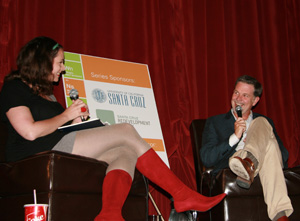Campus News
Netflix CEO: Luck, ‘maniacal determination’ played into company’s success
Speaking to a crowd of 400 at Tuesday’s What’s Next lecture co-sponsored by UCSC, Netflix CEO Reed Hastings shared success tales and early horror stories.

“You’re lodged between two stodgy systems: Hollywood and the postal service,” she said with mock incredulity. “You are taking DVDs and sending them in the mail. Is that an innovative company?”
The answer, of course, is a deafening “yes.” Netflix, a video streaming company, most famous for its flat-rate rent-by-mail DVD service, helped hasten the collapse of archrival Blockbuster, and has reportedly sent out a billion DVD rentals to customers.
Speaking to a crowd of 400 people in downtown Santa Cruz’s historic Del Mar Theatre Tuesday evening, Hastings shared success tales and early horror stories from his 13 years helming a business that burned through venture capital, survived near-bankruptcy, and now boasts 15 million subscribers.
The talk, billed as a “Fireside Chat,” was part of the What’s Next lecture series, co-sponsored by UC Santa Cruz, NextSpace, and the City of Santa Cruz.
The What’s Next Lecture Series aims to take a provocative look at innovation from business, policy, and social change angles, providing inspiration, insight, and the necessary tools for success in the coming years.
Speaking with a calm and casual authority–and seemingly unruffled by any of Lacy’s teasing questions–Hastings spoke of a company whose rise seemed to take everyone, even the founders, by surprise.
Throughout the night, Reed talked about elements that helped Netflix prevail: luck and “maniacal determination,” long-range focus and flexibility, and an ability to distinguish real threats from “paranoid” delusions that can make some CEOs veer their companies off track.
“When we started Netflix in 1997, there was a tremendous risk of no one getting a DVD player,” Hastings said. “It was an exotic, expensive, unusual format. For the first couple of years, the big challenge was, ‘Can we find anyone who has a DVD player.’”
He openly admitted that the company, in the early years, had “gone through hell, almost went bankrupt, and had gone through all the competitive battles.”
Hastings said that the general public should never underestimate the power of desperation. “We had to make it work or we were dead,” he said.
When the company started, the founders vowed to convert half the business from DVDs to movies being streamed and rented over the Internet within five years. But half a decade later, in 2002–the first year that the company was “cash flow positive”–the percentage remained at zero. The same held true in 2007.
But soon afterward, web streaming and net delivery finally came into its own, going from “nothing” to “explosion.”
“We were fortunate to be in the right place at the right time when the tidal wave hit,” Hasting said.
He also spoke of the way the company made decisions, choosing a combination of long-range vision and flexibility over knee-jerk reactivity and “paranoia.”
“You are constantly remembering that the world can change on a dime,” he said. But being paranoid does not help a developing company. “Remember, the paranoid are delusional. The key is to be more like a chess player. Good chess players prune [their potential moves]. There are only a very limited number of scenarios. If you don’t prune properly you get checkmated.”
This pruning strategy helped the company overtake Blockbuster, which simply did not pick up on the threat that Netflix would pose, Hastings said.
Though he conceded that Blockbuster’s stores are well-run, he said the chain was so preoccupied with the threat of videos on demand in the late 1990s that they failed to look at the bigger picture. “They looked at DVDs by mail and said, ‘That’s not a threat.’ They pruned the tree in the wrong way and they ignored it even when we went public.”
Circumstance, and not just strategy, helped them take on Blockbuster, Hastings said.
“We got lucky that they didn’t take it seriously for a long time,” he quickly added.
The company is gradually devoting more of its resources to web streaming. Lacy asked whether such a practice would “cannibalize” the DVD-renting portion of the company and if he was “knowingly eviscerating” the subscription service.
Hastings responded that the company always wanted to “become” Netflix–a purely web-streaming company, but used DVDs as a tool to increase its presence and publicize its large selection.
“We are just replacing the delivery mechanism and keeping the business intact. We knew this was coming,” he said.
The downside of DVD renting is the “tremendous” postal costs. Streaming movies will reduce the company’s costs from $1 for each DVD rental to less than a nickel for streaming.
UCSC Chancellor George Blumenthal, in his opening remarks, spoke of technology’s importance to future jobs in Santa Cruz County, and UCSC’s strong role in creating those jobs. He mentioned the talented workforce that already lives here, along with the tech- and business-minded professors and students on campus.
“If we can harvest their skills and allow them to live and work here, that will be a tremendous achievement for the community,” Blumenthal said.
He mentioned UCSC’s new computer game design program, and two UCSC alumni who are players in the high tech world–Cruzio founder and CEO Peggy Dolgenos, and Sol Lipman, founder of Rally Up, recently acquired by AOL.
“I think the future is bright,” Blumenthal said. “Maybe we’ll be the origin of the next version of Facebook.”